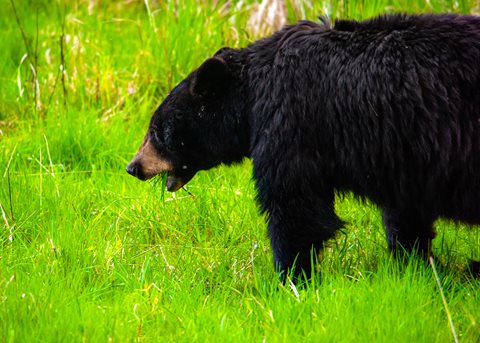News – Sheridan Media
The Wyoming Game and Fish Department has reported a sub-adult male black bear was euthanized by Game and Fish personnel on the afternoon of June 20.
According to the department, personnel have been responding to multiple reports of a bear accessing garbage and other attractants at various locations near Big Horn since the end of May. Reports included the bear accessing unsecured garbage, cat food left on a porch, bird feeders and other attractants.
A trap was set for the bear on June 9 and 10, but that effort was unsuccessful. Personnel attempted to chemically immobilize the bear on the evening of June 17. The immobilization chemicals were not effective and the bear’s location was lost at dusk.
On June 19, the bear entered a house on River Street and entered a second house on Brinton Road on the morning of June 20. That afternoon, a resident called to report the bear was at her home. When personnel responded, the bear was eating seed from bird feeders on the porch and the decision was made to euthanize it.
“The bear’s behavior had become more brazen in recent days and relocation was not an option,” Sheridan Game Warden Ryan Kenneda said. “This bear had lost its fear of humans and in fact, realized that staying near human habitations allowed it to reliably get food.”
“In recent days, several of us went door to door in several Big Horn neighborhoods, asking residents to secure attractants so the bear would not have incentive to stay in the area,” he said. “If folks were not home, we left flyers about the importance of securing attractants from bears. The maintenance crew at the Powder Horn committed to securing garbage and most Big Horn homeowners were responsive and willing to start bear-proofing around their house. But unfortunately, some residents chose to keep their attractants out.”
This incident comes days after the relocation of multiple bears from the Sheridan area.
According to the Game and Fish, the evening of June 19, a female black bear and two young-of -the-year cubs were trapped and relocated from the Big Horn area. She and the cubs were relocated to a remote area of the Bighorn Mountains.
On the evening of June 15, Game and Fish personnel responded to a report of a black bear at a group camp in Story that had been accessing garbage the previous day. The young female bear was immobilized and relocated to a remote area of the Bighorn Mountains.
On June 14, personnel responded to a report of a bear on Coffeen Avenue, north of East Lane. The young female bear was immobilized and relocated to a remote area of the Bighorn Mountains.
“In these cases, the bears were considered candidates for relocation because members of the public contacted us quickly and we could intervene when the bears were initially coming into conflict with humans and getting into garbage and other attractants,” Sheridan District Wildlife Biologist Eric Maichak said. “But beyond just notifying us of conflicts, we really need the public’s help in preventing conflicts by securing attractants.”
Relocation is more successful when a bear has not established a pattern of behavior seeking out or becoming comfortable around humans and human habitations – called food conditioning or habituation. This makes it very important for homeowners to call Game and Fish as soon as a conflict occurs so wildlife managers can respond promptly.
According to Game and Fish, residents can help prevent potential conflicts with black bears and other wildlife by securing attractants such as pet food, livestock and poultry feed, and barbecue grills in a hard-sided building. Garbage should also be stored in a hard-sided building until the morning of its pickup.
Additionally, attractants such as birdseed, suet or hummingbird feeders should be hung out of the reach of bears – at least 10 feet off the ground and four feet from a tree trunk or pole.
Electric fencing is an effective way to protect animals such as chickens, goats and pigs, as well as beehives, vegetable gardens, compost piles and fruit trees.
Learn more about living and recreating in bear country, by clicking here.
Any sightings of a bear in residential or developed areas should be reported as soon as possible to the Game and Fish Regional Office at 307-672-7418 during regular business hours or to a local law enforcement agency.
Last modified: June 21, 2023




